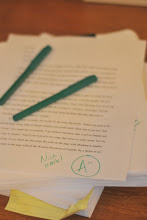I've finally started reading a book I've had on the shelf for a few months now: Adolescent Literacy: Turning Promise into Practice, a recent edited volume by Kylene Beers, Robert Probst, and Linda Reif. They invited the leading teachers of and thinkers about adolescent literacy to write about what that means now in the 21st century.
In the introduction, Beers shares the letter that the three editors wrote to invite contributors to participate. In this, I see one of the best articulations of the current landscape in education: "globalization means our middle and high school students will increasingly find themselves living in a world persuasively described in Friedman's bestselling book, The World is Flat. It means recognizing that literacy demands are shifting and becoming more complex. It means understanding that automation--a part of our technological world--will change the landscape of the job market (the grocery cashier in the next decade will be the exception and not the rule). As automation expands, different jobs emerge--jobs that require creating, synthesizing, and evaluating. They will be held by those with ingenuity, imagination, and empathy, those who are willing to take risks and work cooperatively. We should be preparing students for such a world, yet the politicization of education has resulted in a different agenda where a prescribed assembly-line curriculum seemingly asks only that students pass a test. The current focus on high-stakes tests produces students who can answer multiple-choice items but have lost the interest and agility to ask probing questions, to conceptualize our new world" (xii).
Yes. This is the challenge before us. And this is where I'm trying to take my students. But as we head here into two weeks mired in our mandated state testing, I wonder how well the current policy wave will get us there.
M. Shelley
Monday, February 28, 2011
Subscribe to:
Post Comments (Atom)


No comments:
Post a Comment